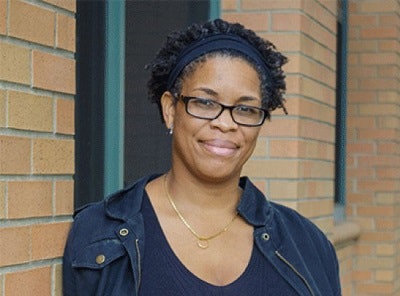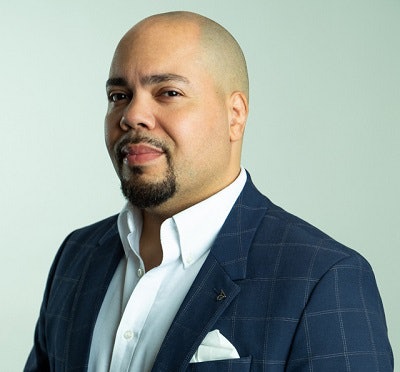Dr. Patricia A. Matthew, an associate professor of English at Montclair State University, has become a sought-after expert on diversity in academic tenure, although most of her scholarly writing and teaching are in British literature and romanticism.
Matthew’s road from researching the Brits to tackling the tenure process in American academia was paved with revelatory stories of Black women striving to achieve the elusive prize of tenure, and often falling short. At the center was Matthew’s own unusual saga.
 Dr. Patricia A. Matthew
Dr. Patricia A. MatthewHer personal experience in 2011 — during which a university president overruled her provost’s denial — and the writings of other women resulted in her 2016 book, Written/Unwritten: Diversity and the Hidden Truths of Tenure, which was praised by the New York Journal of Books as “a timely and courageous contribution to the exploration and critique of the operation of power as it refracts against diverse, non-dominant identities in American higher education.”
Matthew explained in the book’s preface that “the catalyst for this project — for my decision to add a focus on diversity in higher education to my work on nineteenth-century British fiction—was hearing about four women of color at the University of Michigan [who were] all denied tenure in the same year.” Matthew said she became aware of their situation in the midst of her own tenure battle as she was “planning for a meeting with my university’s provost to ask him to reconsider his decision to recommend against tenure.”
So, Matthew embarked on an examination of the plight of Black women who were denied tenure in subjective, sometimes inexplicable circumstances, inspired by her own ultimately successful journey. “I put my own experiences in the preface of the book because I didn’t want people to think I was hiding anything, so I just told my story.” She invited other scholars to write chapters in the book describing the challenges they faced. “I wondered if there was a pattern and I wanted to find out if there were things that faculty who were successful wanted to discuss about their paths,” Matthew told Diverse.
She cites practices in the University of California system and at Wheaton College as examples of institutional advances in the area of faculty diversity. Matthew’s key advice to tenure track faculty, culled from her journey and those of others, centers around learning the culture and expectations of your institution. “I think you can actually tell what the university wants if you look at the CVs of the recently tenured faculty,” Matthew advises, noting that vitae are usually available online. “I think your first job is to understand the culture of your department in real terms, not what they say in orientation and not what you happen to hear.”
And this is one thing on Matthew’s list of what not to do: “Don’t get caught up in service.” The additional burden often placed on faculty of color to serve on numerous committees can be a distraction. “Just say no,” she advises. “Your job when you get hired is not to fix your university’s diversity problems; your job is to get tenured.”
Who’s responsible for fixing the system?
 Dr. Jeni Hart
Dr. Jeni HartWhile Dr. Jeni Hart, professor of higher education and dean of the Graduate School at the University of Missouri, agrees that the tenure process is weighted against minority faculty, she offers a different approach for remedy. “It is not their [the tenure candidate’s] job to fix it, it is our job to fix the system so that they don’t have to figure out how to fit into the structure that’s in place,” Hart explains. “It’s the structure that’s the problem.”
Hart, who has published groundbreaking articles on diversity in higher education, argues that the current discourse and activism surrounding campus diversity is prompting institutions to rethink tenure policies and practices.
“Students are letting us know that issues of diversity and inclusion matter and have implications for them,” Hart adds. “That has played into some of the changes that have happened on our campuses. We have needed to be responsive to students and they have been right to be activists.”
At the same time, Hart says more innovative practices are needed. According to Hart, institutions must take responsibility for policies and practices “that perpetuate racism, sexism, homophobia and all of those forms of discrimination … we should have a system where people can be successful without having to put a lot of emotional energy into figuring out how to navigate a system that wasn’t meant for them.”
 Dr. Julian Vasquez Heilig
Dr. Julian Vasquez HeiligDr. Julian Vasquez Heilig, another scholar and administrator who has researched the subject, concurs. Heilig, who is dean of the University of Kentucky School of Education, says diversity problems often precede the tenure process. “Underrepresentation in graduate degrees leads to underrepresentation in faculty diversity,” Heilig says. “Scholars of color have a lot of headwinds, and we as academic leaders need to do a better job; we need to make sure faculty of color have access to all of the opportunities they need.”
Heilig co-authored a study published earlier this year that found that despite steady increases in faculty diversity since the early 1990s, “the largest gains for faculty diversity have occurred in untenured positions.” Heilig says remedies should be considered in an intentional, deliberate manner. “Diversity is not something happenstance,” Heilig adds. “It has to be strategic and it has to be a priority.”
He suggests additional training, not just for search committees but also for tenure committees. This is in addition to “providing bridge funds, making sure chairs understand that a couple of negative reviewer letters can sink a tenure file.”
The aftermath of tenure denial
For Dr. Arica Coleman, a former assistant professor of Black American Studies at the University of Delaware, the tenure quest failed after she spent more than four years receiving what she called “stellar reviews,” and obtaining a publishing contract with Indiana University Press for her 2013 book, That the Blood Stay Pure: African Americans, Native Americans, and the Predicament of Race and Identity in Virginia. Coleman describes her ordeal as “academic hazing.”
Coleman explains that she was one of four Black women — two of them in Africana Studies and two in other departments — who also taught Black studies courses. “None of us; not one, became tenured at UD. Not one,” Coleman says. The others, who had been hired a year or two before her, left the university before she left in 2013. “I was the last one standing from that group,” she quips. Immediately following her departure Coleman filed a complaint with the Equal Employment Opportunity Commission citing race and gender discrimination, but the EEOC closed the case in 2015 stating it could not conclude that the university had discriminated against Coleman, whose attorney was able to have the case reopened, only to be shut down again in 2016.
Coleman did not go quietly into the night. She posted an “An Open Letter to the Department of Africana Studies at the University of Delaware” on a blog site called The Professor Is In. She has become an outspoken critic not only of the tenure system but of institutional racism throughout academia — and the greater society.
She says she is completing a new book and has published frequently in popular publications including Time, The Washington Post and The Crisis.
Coleman offers these suggestions to other tenure seekers, particularly Black women in the academy: Seek out advocates and mentors. “There should be someone who sits down with you and helps you map out how you can meet certain goals.” She also urges scholars to have a backup plan. “Nothing is going to guarantee you tenure because it’s so subjective and the problems are so deeply rooted.”
![faculty-salary[1547520018]](https://img.diverseeducation.com/files/base/diverse/all/image/2021/04/edu.faculty-salary1547520018-e1618425046370.png?auto=format%2Ccompress&fit=crop&h=107&q=70&w=160)
![faculty-salary[1547520018]](https://img.diverseeducation.com/files/base/diverse/all/image/2021/04/edu.faculty-salary1547520018-e1618425046370.png?auto=format%2Ccompress&fit=crop&h=100&q=70&w=100)


![faculty-salary[1547520018]](https://img.diverseeducation.com/files/base/diverse/all/image/2021/04/edu.faculty-salary1547520018-e1618425046370.png?auto=format%2Ccompress&fit=crop&h=167&q=70&w=250)








